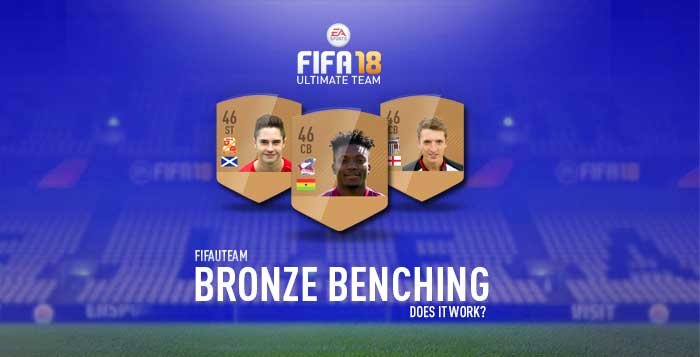Thousands of FUT players use bronze benching hoping to play against easiest opponents. The question is: does it works? Let’s find out the opinion of our friend crlarsen, owner of futfacts.com, a FIFA Ultimate Team website dedicated to people who prefer knowing over believing.
Does Bronze Benching Work?
According to a recent Reddit post written by Arlington69, using a bronze bench increases the chances of being matched with weaker opponents – in terms of squad quality.
The author noted his own team rating as well as the opponent’s team rating for nearly 700 matches. Using the data, he created various graphs, including the one below. He observed that the bulk of his opponents were lower rated when using an 82-rated squad (light blue graph) than when he was using his 86-rated squad (dark blue).

At a glance, it indeed could seem as if the opponent’s squad rating depends on your own rating. If that’s the case, it’s reasonable to assume that bronze benching will give you easier opponents.
However, things tend to turn out differently if you beyond glancing.
What is Bronze Benching?
Before we dig deeper into the story, let us take a brief look at why people do something as apparently illogical as bronze benching. At its core, it seems counterintuitive to put 46-rated Tommy Käßemodel, an actual kit man for his club, on as potential substitute for your best midfielders.
But there is a rationale – sort of.
First, there is the longstanding belief that the game handicaps the higher rated team. Despite it’s logical flaws, a lot of people hold on to this idea and will consequentially seek to lower their team rating.
Second and more importantly, bronze benching did make sense back when FUT online friendlies was big. Online friendlies matched you based on squad quality. Some people believe that the sample applies to FUT seasons, Weekend league and Daily knockout tournaments.
The fact that EA has stated that FUT Seasons is about bringing your best team to the pitch has never prevented anyone from assuming the opposite. And that’s perhaps where Arlington69’s wondering started.
The Truth about Bronze Benching
Now, let’s head back to Arlington69’s colourful chart. It does indeed seem to suggest that there overall is a connection between your squad rating and the opponent’s squad rating. There are however a couple of problems with this conclusion.
Firstly, the mere fact that squad rating and opponent squad rating are correlated, does not necessarily imply that own squad rating determines what opponents you meet. I will revert to this later.
Second, it is a stretch to conclude that the two variables are correlated. Looking at the chart, I see traces of correlation, but I definitely also see traces of the opposite. Most notably, there is the orange curve (85-rated).
Does your own rating really determine the opponent’s squad rating?
As I had access to the full data set, I had the opportunity to calculate the correlation coefficient, r. The correlation coefficient is a statistical measure of the strength of correlation.
When looking at the full data set of 770 matches, I get r=0.43 (weak/moderate correlation). But as the sample is divided into two sections, namely matches played before and after the kick off glitch patch, I calculated the correlation coefficient for each of those sections as well. Particularly noteworthy is the correlation coefficient for the pre patch sample: r=0.14 (no correlation).
If you want to make the case that bronze benching helps by bringing you easier opponents, you will need to explain this first.
The Third Factor
So, why does it seem as if there is some degree of correlation when looking at the chart above? The thing is that very often, two variables appear correlated because they are under influence from a third factor. And that third factor is very obvious in this case:
As time goes, most people improve their squads. This applies to Arlington69 as well as his average opponents.
In the pre patch part of the sample, Arlington69 used an 83-rated squad on average. In the second half, he had upgraded to 84.5. A similar improvement happened to his average opponent.
To illustrate this point, I turned Arlington69’s entire sample into the chart below. On the Y-axis, we have rating. All items are displayed in the order they were found in, meaning that the X-axis is a crude timeline with no fixed units.
It’s clearly visible that your own squad rating doesn’t determine which opponents you get matched up against. Bronze benching doesn’t work.

